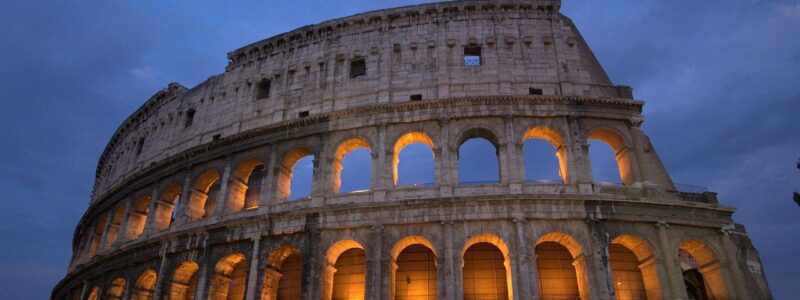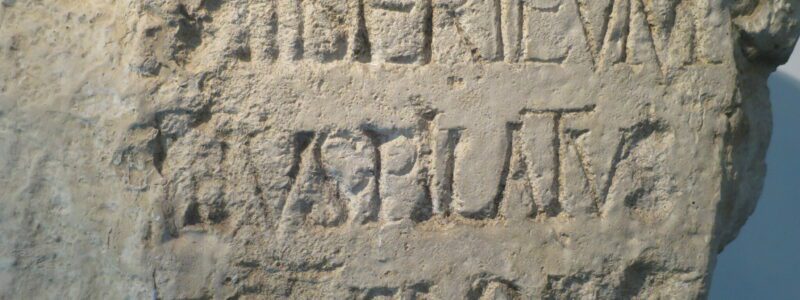Secular Eyewitnesses to Christ
I have discussed several ancient secular eyewitnesses to Christ in another post evaluating the historicity of Scripture from a broad perspective. In this article, I am going to concentrate on the evidence substantiating the historicity of Christ.
The historicity of Christ is, after all the most important question that must be answered regarding all of Scripture. As Paul said, if the Resurrection of Christ did not happen, then Christians are deluded and, above all, to be pitied. If Christ did not exist, then neither did the Resurrection.
I will only evaluate secular, extra-Biblical sources for the historicity of Christ to avoid the objection of bias concerning Biblical sources. Christians were always an annoyance to the ruling Roman government just as we are today. Writings from government officials, poets, contemporary secular historians, and Jewish sources (who considered Jewish Christians to be heretics), all inadvertently establish the historicity of Christ. Furthermore, many of these writings substantiate important details concerning the life of Christ, such as his Resurrection.
Thallus and Phlegon
Thallus is one of the earliest writers to substantiate the gospel narratives. Unfortunately, the totality of his work does not survive today, but many ancient church fathers quoted him extensively in their writings. Most current scholars date his writing to about 50 AD, so he was a contemporary of Paul and the other apostles and may have been a witness to the events surrounding the death of Christ in 33 AD.
Julius Africanus, writing in the third century, quotes from Thallus,
Concerning each of his deeds and his cures, both of bodies and souls, and the secrets of his knowledge, and his Resurrection from the dead, this has been explained with complete adequacy by his disciples and the apostles before us. A most terrible darkness fell over all the world, the rocks were torn apart by an earthquake, and many places both in Judaea and the rest of the world were thrown down. In the third book of his Histories, Thallos dismisses this darkness as a solar eclipse. In my opinion, this is nonsense. …

Josephus – By William Whiston (originally uploaded by The Man in Question on en.wikipedia.org) https://sites.google.com/site/josephuspaneas/, Public Domain, Link
Africanus is correct in objecting to the explanation offered by Thallus regarding a solar eclipse causing the darkness described in Scripture. Christ was crucified at the time of the Jewish Passover when the moon is always full (and actually in eclipse itself during the crucifixion). From an astronomical standpoint, a full moon can never produce a solar eclipse.
Interestingly, this description does not try to explain away the crucifixion and its darkness but rather reports its occurrence and tries to explain it from a natural perspective.
This historicity of Thallus is further substantiated by a ninth-century Byzantine historian George Syncellus who cites Julius Africanus as writing this reference to the crucifixion darkness,
On the entire world there appeared fearful darkness; and the rocks were rent by an earthquake, and many places in Judea and other districts were thrown down. In the third book of his ‘History’, this darkness Thallus calls, as appears to me without reason, an eclipse of the sun.
Josephus may also have alluded to Thallus in his book Antiquities of the Jews (18.6.4) when he writes,
Now there was one Thallus, [another Samaritan] a freed-man of Caesar, of whom he borrowed a million of drachmae, and thence repaid Antonia the debt he owed her; and by sending the overplus in paying his court to Caius, became a person of great authority with him
Phlegon was another ancient writer whose works have only survived in fragments. He wrote in 140 AD and is referenced by many ancient church fathers. Africanus reports that Phlegon concerning the crucifixion eclipse darkness descended upon the earth early in the crucifixion. Phlegon notes,
he [Phlegon] records that in the time of Tiberius Caesar at full moon, there was a full eclipse of the sun from the sixth hour to the ninth.
Origin was another prolific church father who substantiated the claim by Phlegon when writing Against Celsus, noting,
And with regard to the eclipse in the time of Tiberius Caesar, in which reign Jesus appears to have been crucified, and the great earthquakes which then took place, Phlegon too, I think, has written in the thirteenth or fourteenth book of his Chronicles.
Origin also notes,
Now Phlegon, in the thirteenth or fourteenth book, I think, of the Chronicles, not only ascribed to Jesus a knowledge of future events (although falling into confusion about some things which refer to Peter, as if they refer4red to Jesus), but also testified about the result corresponded in His predictions. So that he also, by these very admissions regarding foreknowledge as if against his will, expressed his opinion that the darkness taught by the fathers of our system was not devoid of divine power.
Origin also notes,
Regarding these, we have in the preceding pages made our defence, according to our ability, adducing the testimony of Phlegon, who relates that these events took place at the time when our Savior suffered.
Phlegon is important to the establishment of the historicity of Christ in that he does not doubt the fact of Christ’s existence and even substantiates the face of the crucifixion, along with the darkness that surrounded it along with the great earthquakes documents in Scripture.
Josephus
Josephus is a colorful Jewish historian writing in the first century. He was a Jewish general in the Jewish revolt of 70 AD, but was captured and changed sides, and began working with the Romans. Rome recognized he could no longer return to his homeland after becoming a traitor and gave him a residence and pension, allowing him to write a historical account of the Jewish nation in 93 AD.
There are three passages in his antiquities that are of particular importance in establishing the historicity of Jesus. Josephus writes about John the Baptist, who is a central figure in the life of Christ and was his first cousin.
But to some of the Jews the destruction of Herod’s army seems to be divine vengeance, and certainly a just vengeance, for his treatment of John, surnamed the Bapitst. For Herod had put him to death, though he was a good man and had exhorted the Jews to lead righteous lives, to practice justice toward their fellows and piety towards God, and sop doing to join in baptism. In his view, this was a necessary preliminary if baptism was to be acceptable to God. They must not employ it to gain pardon for whatever sins they committed, but as a consecration of the body implying that the soul was already thoroughly cleansed by right behavior. When others too joined the crowds about him, because they were aroused to the highest degree by his sermons, Herod became alarmed. Eloquence that had so great an effect on mankind might lead to some form of sedition, for it looked as if they would be guided by John in everything that they did. Herod decided therefore that it would be much better to strike first and be rid of him before his work led to an uprising than to wait for an upheaval, get involved in a difficult situation, and see his mistake. Though John, because of Herod’s suspicions, was brought in chains to Machaerus, the stronghold that we have previously mentioned, and there put to death, yet the verdict of the Jews was that the destruction visited upon Herod’s army was a vindication of John, since God saw fit to inflict such a blow on Herod.
This independent historian wrote details concerning John the Baptist that is identical to the New Testament. This includes John’s righteousness, popularity with the people, and death. The passage does not speak about Christ, but it does lend credence that the gospels accurately portray historical events.
Josephus also wrote about James, the brother of Jesus. He refers to Ananus (Ananias), the High Priest at the time of James, the brother of Christ.
Josephus writes that Ananias,
convened the judges of the Sanhedrin and brought before them a man named James, the brother of Jesus who was called the Christ, and certain others. He accused them of having transgressed the law and delivered them up to be stoned.
Most modern scholars consider this passage genuine since the phrase “James the brother of Jesus who is called Christ” is too non-committal to have been inserted by a later Christian interpolator who wanted to promote the messiahship of Christ. Furthermore, the ancient church father Origin refers to this passage in his Commentary on Matthew, giving evidence that it was in Josephus’ writing at that time in about 200 AD.
“James, the brother of Jesus, who is called Christ,” is the most precise language Josephus could have used to describe this trial. It is consistent with the precision of Josephus’ writings, and most scholars have found no real reason to doubt its authenticity.
Josephus and the identity of Jesus. This passage is known as the Testimonium Flavianum reading,
About this time there lived Jesus, a wise man if indeed one ought to call him a man. For he was one who wrought surprising feats and was a teacher of such people as accept the truth gladly. He won over many Jews and many of the Greeks. He was the Messiah. When Pilate, upon hearing him accused by men of the highest standing amongst us, had condemned him to be crucified, those who had in the first place come to love him did not give up their affection for him. On the third day he appeared to them restored to life, for the prophets of God had prophesied these and countless other marvelous things about him. And the tribe of the Christians, so called after him, has still to this day not disappeared.
The genuineness of this passage has been debated for many generations, with seemingly no resolution possible. However, there was some resolution in discovering an ancient Arabic copy of this passage by Josephus. There is a fourth-century Arabic version that is translated,
At this time there was a wise man who was called Jesus. And his conduct was good, and [he] was known to be virtuous. Any many people from among the Jews and the other nations became his disciples. Pilate condemned him to be crucified and to die. And those who have become his disciples did not abandon his discipleship. They reported that he had appeared to them these days after his crucifixion and that he was alive, according he was perhaps the Messiah concerning whom the prophets have recounted wonders.
It seems unlikely that Josephus, a Jewish writer being taken care of by and writing to the Romans, would have referred to Jesus as the Messiah. This would imply the Romans killed a virtuous man likely by error and likely would not have been well received. Josephus was very careful not to offend those giving him sanctuary from the Jews who considered him a traitor. The second rendering of this passage is more likely nearer the real version called referring to Jesus as somebody who “was perhaps the Messiah.”
Pliny The Younger
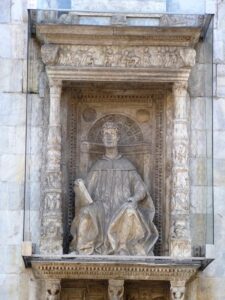
Pliny the Younger was the governor of a province in what is now modern Turkey who harshly judged Christians. Pliny the Younger – By JoJan – Self-photographed, CC BY 3.0, Link
We met Pliny in another blog post, but we will go a little deeper here. He was the nephew and adopted son of the elder Pliny. Pliny the Elder perished in the eruption of Mount Vesuvius. The historian Bruce says of Pliny the Younger,
Pliny is one of the world’s great letter-writers, whose letters, unlike the ephemeral notes that most of us write, intended only for the perusal of the recipient, were written with one eye on a wider public and have attained the status of literary classics.
While only a few scant pages of most ancient scholars have survived to the present day, there are ten volumes of Pliny’s correspondence available for study. He served as a governor of Bithynia, a Roman province in Asia Minor or modern Turkey. Pliny gives excellent information regarding the Christian population living in his province in this long letter to Emperor Trajan,
It is a rule, Sir, which I invariably observe, to refer myself to you in all my doubts; for who is more capable of guiding my uncertainty or informing my ignorance? Having never been present at any trials of the Christians, I am unacquainted with the method and limits to be observed either in examining or punishing them, whether any difference is to be made on account of age, or no distinction allowed between the youngest and the adult; whether repentance admits to a pardon, or if a man has been once a Christian it avails him nothing to recent; whether the mere profession of Christianity, albeit without the commission of crimes, or only the charges associated therewith are punishable – on all these points I am in considerable perplexity.
In the meantime, the method I have observed towards those who have been denounced to me as Christians is this: I interrogated them whether they were in fact Christians; if they confessed it, I repeated the question twice, adding the threat of capital punishment; if they still persevered, I ordered them to be executed. For whatever the nature of their beliefs might be, I could at least feel no doubt that determined contumacy and inflexible obstinancy deserved chastisement. There were others also possessed with the same infatuation, but being citizens of Rome, I directed them to be taken to Rome for trial.
These accusations spread (as is usually the case) from the mere fact o f the matter being investigated, and several forms of the mischief came to light. A placard was put up, without any signature, accusing a large number of persons by name. Those who denied they were or had ever been, Christians, and who repeated after me an invocation to the gods, and offered formal worship with libation and frankincense, before your statue, which I had ordered to be brought into Court for that purpose, together with those of the gods, and who finally cursed Christ – none of which acts, it is said, those who are really Christians can be forced into performing – these I thought it proper to discharge. Others who were named by the anonymous informer as first confessed themselves Christians, and then denied it true, they said, they had been of that persuasion but they had quitted it some three years, others many years, and a few as much as twenty-five years previously. They all worshipped your statue and the images of the gods and cursed Christ.
They affirmed, however, that the whole of their guilt, or their error, was that they were in the habit of meeting on a certain fixed day before it was light, then they sang in alternate verses a hymn to Christ, as to a god, and bound themselves by a solemn oath, not to perform any wicked deed, never to commit any fraud, theft or adultery, never to falsify their word, nor deny a trust when they should be called upon to make it good; after which it was their custom to separate, and then reassemble to partake of good – but food of an ordinary and innocent kind. Even this practice, however, they had abandoned after the publication of my edict, by which, according to your orders, I had forbidden political associations. I, therefore, judged it so much the more necessary to extract the real truth, with the assistance of torture, from two female slaves, who were styled deaconesses; but I could discover nothing more than depraved and excessive superstition.
I, therefore, adjourned the proceedings and betook myself at once to your counsel. For the matter seemed to me well worth referring to you – especially considering the numbers endangered. Persons of all ranks and ages, and of both sexes are, and will be, involved in the prosecution. This contagious superstition is not confined to the cities only but has spread through the villages and rural districts. It seems possible, however, to check and cure it. It is certain at least that the temples, which had been almost deserted, begin now to be frequented; and the sacred festivals, after a long intermission, are again revived; while there is a general demand for sacrificial metat, which for some time past had met with but a few purchases. For hence it is easy to imagine what multitudes may be reclaimed from this error, if a door be left open to repentance.
Trajan agreed that being a Christian was indeed a crime worthy of punishment.
My dead Secundus; You have acted with perfect correctness in deciding the cases of those who have been charged before you with being Christians. Indeed, no general decision can be made by which a set form of dealing with them could be established. They must not be ferreted out; if they are charged and convicted, they must be punished, provided that anyone who denies that he is a Christian and gives practical proof of that by invoking our gods is to be pardoned on the strength of this repudiation, no matter what grounds for suspicion may have existed against him in the past. Anonymous documents which aere laid before you should receive no attention in any case; they form a very bad precedent and are quite unworthy of the age in which we live.
This communication confirms several details concerning early Christianity, which are outlined in Scripture,
- Christians who were citizens of Rome were sent to Rome to be tried, as in the case of Paul,
- Some Christians recanted their belief in Christ and were pardoned just as Christ predicted in the Parable of the Soils;
- The Christians held Christ to be God
- They possessed exemplary moral character;
- Some women in the early church held the rank of deaconess
- Many people in this jurisdiction were Christians,
- The spread of Christianity was detrimental for several trades relying upon sacrifices to Roman idols (such as with the silversmith of Acts 19)
The fact remains that by the time this was written, many Christians living in Asia Minor were willing to be tortured and executed for their belief in Christ, even though apparently, some recanted their faith. It isn’t easy through this communication to know the relative amounts of each.
Cornelius Tacitus
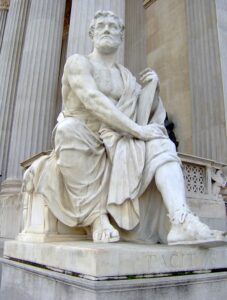
Tacitus – By Pe-Jo – Own work, Public Domain, Link
Tacitus is “universally considered the most reliable of historians, a man in whom sensibility and imagination, though lively, could never spoil a critical sense rare in his time and a great honesty in the examination of documents.” (Amiot, Francois, The Sources for the Life of Christ, 1962)
This Roman historian was born between 52 and 55 AD and became a senator under the reign of Vespasian, and in 112 and 113, was proconsul or governor of Asia. He was a friend of Pliny the Young, governor of the neighboring province of Bithynia. In his Annals in 116, Tacitus wrote about Emperor Nero and his response to the great fire that swept through Rome in 64. There was a persistent rumor that Nero was in fact responsible for the fire and that he blamed the conflagration on Christians.
So far, the precautions taken were suggested by human prudence now means were sought for appeasing deity, and application was made to the Sibylline books; at the injunction of which public prayers were offered to Vulcan, Ceres, Proserpine, while Juno was propitiated by the matrons, first in the Capitol, then at the nearest point of the sea shore, where water was drawn for sprinkling the temple and image of the goddess. Ritual banquets and all-night vigils were celebrated by women in the married state. But neither human help, nor imperial munificence, nor all the modes of placating Heaven, could stifle scandal or dispel the belief that the first had taken place by order. Therefore, to scotch the rumor, Nero substituted as culprits and punished with the utmost refinements of cruelty, a class of men, loathed for their vices, whom the crowd styled Christians. Christus, the founder of the name, had undergone the death penalty in the reign of Tiberius, by sentence of the procurator Pontius Pilatus, and the pernicious superstition was checked for a moment, only to break out once more, not merely in Judea, the home of the disease, but in the capital itself, where all things horrible or shameful in the world collect and find a vogue. First, then, the confessed members of the sect were arrest; next, on their disclosures, vast numbers were convicted, not so much on the count of arson as for hatred of the human race. And derision accompanied their end; they were covered with wild beats’ skins and torn to death by dogs, or they were fastened on crosses, and, when daylight failed were burned to serve as lamps by night. Nero had offered his Gardens for the spectacle, and gave an exhibition to his Circus, mixing with the crowd in the habit of a charioteer, or mounted on his car. Hence, in spite of a guilt which had earned the most exemplary punishment, there arose a sentiment of pity, due to the impression that they were being sacrificed not for the welfare of the state but to the ferocity of a single man.
This report by a respected Roman historian is another testimony to the origin and extent of Christianity in the ancient Roman empire. Additionally, Tacitus provides a firm conviction of the presence of Christians in Rome only thirty years after the death of Christ.
Some have tried to attack the genuineness of this passage. Still, top classics authorities such as Oxford, classicist, and noted Tacitan specialist Henry Furneaux), and the conclusion is that the evidence is just too great for it is from the hand of Tacitus. The writing style is “Tacitan Latin,” and the passage does not speak well of the Christians.
For obvious reasons, atheists have attacked this account as fraudulent, or at the very least, that Tacitus was only reporting what he had heard about Christians, not actual facts. But the facts argue otherwise. As a Roman Senator and high government official, he would have access to the best records available in the Roman Empire at the time. He was a meticulous historian and tried not to report as fact something that he had only heard on hearsay. For example, he tended to append his records with “some have put it on record” or “: As the general account gives.”
Maurice Goguel, former Professor of Theology at the University of Paris, notes that the absence of words such as “it is said” argues that “Tacitus knew of a document, which was neither Jewish nor Christian, which connected Christianity with the Christ crucified by Pontius Pilate.
Hadrian
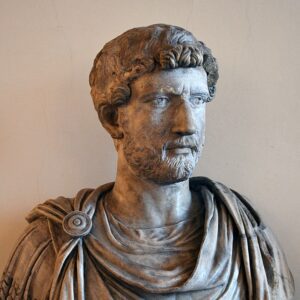
Hadrian – ByLivioandronico2013; – Own work, CC BY-SA 4.0, Link
Christians in Asia seemed to be a particularly troublesome bunch, especially to the Romans. Serenius Granianus, proconsul of Asia during the first part of the second century, wrote to Hadrian, the Emperor of Rome, asking for advice.
It seems that the Christians were converting others to their belief system and developing a relationship with Christ. The problem was these newly minted Christians had no further need for idols made by silversmiths, causing a bit of an economic downturn. Furthermore, this Jesus was not an approved god by the Roman Empire, and Christians were hauled into court to explain themselves. In those days, it was a high crime not to support the Roman gods because it implied they did not support Rome itself.
The Romans would ignore almost any crime other than not honoring the Roman system. Such dishonor might eventually lead to outright treasonous acts if left unchecked. Hadrian wrote back a letter concerning the official Roman position about what to do with these Christians,
I do not wish, therefore, that the matter should be passed by without examination, so that these men may neither be harassed, nor opportunity of malicious proceedings be offered to informers. If therefore, the provincials can clearly evince their charges against the Christians, so as to answer before the tribunal, let them pursue this course only, but not by mere petitions, and mere outcries against the Christians. For it is far more proper if anyone would bring an accusation, that you should examine it.
This short message substantiates the presence of Christians in an area distant from Jerusalem, and that they were considered a potential threat to the Empire and must be controlled. He was having a similar problem to that of Pliny the Younger noted above.
Interestingly, the letter was preserved by Eusebius, one of the Church Fathers.
Suetonius
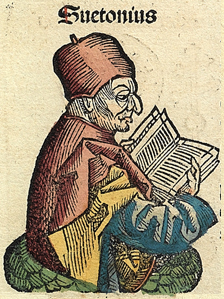
Suetonius – By Michel Wolgemut, Wilhelm Pleydenwurff (Text:Hartmann Schedel? – Self-scanned, Public Domain, Link
Suetonius was another Roman historian who wrote in the first part of the second century. He substantiated Acts 18 that Jews were expelled from Rome during the reign of Claudius but also mentioned somebody named “Chrestus.”
As the Jews were making constant disturbances at the instigation of Chrestus, he expelled them from Rome.
The identity of “Chrestus” has been a point of discussion among historians as it was a fairly common name at the time. It also could be a simple misspelling of “Christus, ” the Greek name for “Christ.”
It seems likely that the Christian Jews living in Rome were witnessing to the other Jews, likely resulting in hostility from the Jewish leadership. This hostility was seen as a potential disruption by the Roman authorities, who then took the position that Rome could do with any Jews and expelled them. This means that within only two decades after the death of Christ, Messianic Jews were busy telling other Jews about his life, death, and resurrection. Some Jews would believe, but most would not and reacted bitterly to this crucified Messiah.
Suetonius also comments on the Rome fire that resulted in the slaughter of many Christians cruelly and inhumanly,
Punishment was inflicted on the Christians, a body of people addicted to a novel and mischievous superstition.
This is another secular, even hostile historian who substantiates the existence of Christians in the empire capital of Rome only a few decades after the execution of Christ.
Lucian of Samosata
Substantiation of the historicity of Christ and Christianity was not performed just by the Romans but also by the Greeks. A Greek satirist Lucian wrote about the early Christians and their “lawgiver.”
The Christians, you know, worship a man to this day – the distinguished personage who introduced their novel rights, and was crucified on that account. … You see, these misguided creatures start with the general conviction that they are immortal for all time, which explains the contempt of death and voluntary self-devotion which are so common among them, and then it was impressed on them by their original lawgiver that they are all brothers, from the moment that they are converted, and deny the gods of Greece, and worship the crucified sage, and live after his laws. All this they take quite on faith, with the result that they despise all worldly goods alike regarding them merely as common property.
This is strong evidence for the existence of Christ for the following reasons:
- Lucian was hostile to Christianity, regarding it as a fable and its practitioners as misled. He certainly would have no reason to write anything that would be beneficial to Christianity but rather mocks Christians for worshipping somebody who was crucified,
- Lucian demonstrates that Jesus existed and corroborates the fact of his crucifixion. Even the worst critics of Christianity agreed on the historicity of Christ and also of his mode of execution.
Mara Bar Serapion
Another reference to Christ and the Christians was written by a Syrian. In this writing, he was trying to encourage his son to pursue wisdom,
what advantage did the Athenians gain from putting Socrates to death? Famine and plague came upon them as a judgment for their crime. What advantage did the men of Samos gain from burning Pythagoras? In a moment their land was covered with sand. What advantage did the Jews gain from executing their wise King? It was just after that their kingdom was abolished. God justly avenged these three wise men. The Athenians died of hunger, the Samians were overwhelmed by the sea; the Jews, ruined and riven from their land, live in complete dispersion. But Socrates did not die for good; he lived on in the teachings of Plato. Pythagoras did not die for good; he lived on in the name of Hera. Nor did the wise King die for good; he lived on in the teaching which he had given.
This represents a small part of the entire letter, but it is the relevant part fo this discussion. The reference to Christ is not particularly valuable as we had no idea his references or even when it was written. But it is valuable in showing how some non-Christians viewed Christianity.
It does substantiate a person who was executed, possessed of wisdom, executed before the Jews’ kingdom was abolished, was executed before the Jews were dispersed, was executed by the actions of the Jews, whose teaching lives on, and who was referred to as a “king.”
Summary of Ancient Secular Eyewitnesses to Christ
The purpose of this post was to illustrate the historicity of Christ examined through the eyes of his skeptics. All of these were non-Christian and likely were written before 200 AD. They illustrate the breadth to which religion spread throughout the civilized world and how it disrupted the status quo.
It spread throughout the Roman Empire and was getting big enough to cause alarm from the local Roman government. Romans were a very suspicious lot and were careful to stamp out any sign of rebellion before it could start. They felt Christians might become hostile to the government of Rome because they refused to worship Caesar and the Roman pantheon of gods.
The purpose of this post was only to illustrate the irony that the writings of secular critics of Christianity ultimately substantiate its existence and the existence of Christ as a historical figure. Because of these secular writers and numerous other reasons, most atheist theologians believe in the existence of Christ, that he lived in the time traditionally ascribed to him, that he was crucified and died, and then was buried (somewhere) in Jerusalem. Even though there continued to be and likely will always be outliers who could never be convinced of Christ’s existence, mainstream atheistic theologians accept the minimalist approach to Christ and the Resurrection.
In summary, it is not enough to dispute the existence of Christ or the facts relevant to his crucifixion and death as a relevant scholar. A scholar must also offer alternative explanations for the pertinent facts. For example, the naturalistic hypothesis regarding the resurrection are many, but they remain woefully inadequate as an explanation.
When the totality of information is considered and evaluated using abductive reasons (the simplest and best explanation of the relevant facts) or an “inference to the best explanation.” Furthermore, an atheistic explanation for the alleged Resurrection of Christ and religion, in general, must offer an adequate alternative explanation for the existence of the Universe (created from nothing), the existence of life, fine-tuning of the universe (at every level from sub-atomic to multi-galactic), for consciousness, and – yes – even for the miraculous.
Only then can the atheist hope to have respect in the modern world.
References: Eyewitnesses to Christ
McDowell, Josh; Wilson, Bill: Evidence for the Historial Jesus: A Compelling Case for His Life and His Claims, 1993



